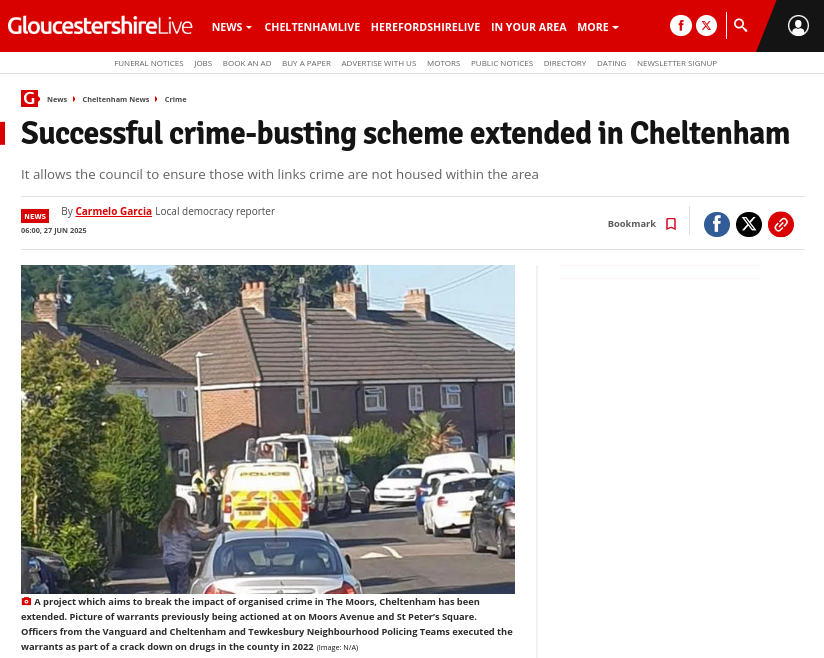Too Soon to Take Credit?

The council’s “Clear – Hold – Build” initiative, which they announced an extension for another five years in Gloucestershire Live on June 27, 2025, is presented as a triumph in combating organised crime and anti-social behaviour in areas like The Moors and St Paul’s. A key component, the local lettings plan, allows the council to deny tenancies to individuals with links to crime or a history of causing issues. This sounds decisive and robust.
However, here’s the critical flaw: there’s no demonstrable link between this policy and the reported successes. The council trumpets “measurable improvements” in crime rates, but where are the specific numbers? We see no crime statistics directly attributed to the scheme, no data on refused tenancies, and no concrete proof that barring a handful of tenants has genuinely impacted Cheltenham’s wider crime problems. It’s akin to a doctor declaring a patient cured without any test results or follow-up.
This isn’t just oversight; it feels like a strategic maneuver. The council appears to be taking credit for broader crime trends, attributing success to their scheme when improvements might have occurred independently. Gloucestershire Constabulary’s own data shows a 7% reduction in recorded crime across the county from 2023 to 2024—a reduction influenced by national policing efforts and community programs. Yet, the council implies their lettings plan is the primary driver. Where is the causal connection? How many tenancies were actually refused—ten, fifty, a hundred? And precisely how does that translate into fewer burglaries or less gang activity? They remain silent on these crucial details, and this vagueness allows them to make broad claims without accountability. It’s a box-ticking exercise: announce a policy, overlay some jargon, and hope no one demands proof.
Reactive Measures, Unaddressed Root Causes
This scheme also appears strikingly reactive. The council seems to intervene only once problems escalate—when crime spikes in areas like The Moors, they roll out this high-profile scheme to project an image of action. But what about addressing issues before they fester? Council tenants understand the real drivers of crime: pervasive poverty, unaffordable rents, and the council's tendency to house vulnerable individuals in estates that then suffer from neglect. Rents in Cheltenham have surged by 6.9% in the past year, with a two-bedroom flat now costing £1,212 a month (ONS). Social housing remains elusive, with only 759 new homes built against a target of 1,174 from 2020 to 2023.
The council’s Housing, Homelessness and Rough Sleeping Strategy promises “sustainable communities,” but it conspicuously avoids these fundamental issues. Instead of investing in affordable housing or actively pursuing rogue landlords, they appear preoccupied with playing gatekeeper, deciding who is “too risky” for certain areas. This isn’t a preventative strategy; it’s a mere reaction. And by refusing tenancies, the council risks simply displacing vulnerable people, often into private rentals where they face exploitation or are pushed towards homelessness. It's a policy that sweeps problems under the carpet, rather than genuinely solving them.
The Unspoken Privatization Threat
Here’s where the picture darkens further. Last year, the council brought Cheltenham Borough Homes (CBH), which manages 4,800 social homes, back in-house after two decades as an arms-length body. They presented this as a victory for tenants—promising greater “efficiency” and “engagement.” But Chelteham tenants have reason to be deeply skeptical. The timing, announced in October 2023 and effective July 1, 2024, feels strategic. Why? Because the council has yet to deny persistent rumours that it is considering selling its housing stock to a private equity firm. Consolidating CBH under direct control could significantly streamline the process of packaging these homes for a quick profit.
It's not like the council doesn't have a track record of stripping Cheltenham of it's collective wealth through sales of community assets.
What would be the likely outcome of a private equity takeover? Look at other councils that chose this path: rents in Thurrock spiked by 20% after a 2022 sale, and maintenance budgets were drastically cut. Vulnerable tenants—precisely those the council already seeks to exclude—would be most at risk. Private firms have no obligation to adhere to equality laws or ensure secure tenancies. They would likely view “troublesome” tenants as liabilities, ripe for eviction. And with Cheltenham’s severe housing shortage—estimated at 8,000 homes short of the target—private rents would inevitably soar even higher, forcing families out of their homes or even out of the area.
The council’s continued silence on the privatization rumours is telling. They are eager to publicize their crime-busting initiatives, but when confronted with tenants’ legitimate fears about losing their secure homes, they become notably silent. This isn’t true leadership; it’s a tactical evasion, seemingly prioritizing short-term financial gains over the long-term stability of its residents. With a the financial risks of the Cyberpark effectively underwritten by Cheltenham council tax payers, the temptation to sell off assets must be immense. But at what profound cost to us, the tenants?
What Tenants Truly Demand
Cheltenham tenants aren't asking for empty jargon or staged photo opportunities. We demand genuinely affordable homes—rents that are capped, not spiraling faster than wages. We need repairs completed in weeks, not months. We need substantially more social housing, not a mere 300 affordable homes a year against a clear need for 600. And crucially, we need a council that genuinely listens, rather than one that hides behind a "Clear – Hold – Build" narrative while allegedly planning a fire sale to private equity.
The council’s current strategy is a masterclass in managerial misdirection: generate buzz about crime reduction, sprinkle in some catchy phrases, and hope no one notices the deepening housing crisis beneath. It's performative, not principled. If they genuinely want to prove us wrong, let them provide the hard data—how many tenancies have been refused, how much crime has demonstrably dropped as a direct result of their specific policy, and what is their clear plan to prevent a private equity takeover? Until they provide this evidence, their scheme remains another tick-box exercise from an administration seemingly more interested in favorable headlines than secure homes.
